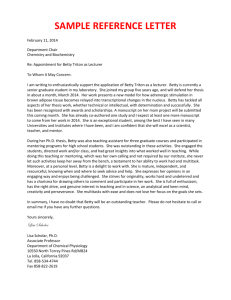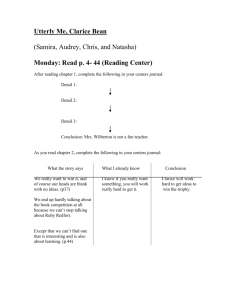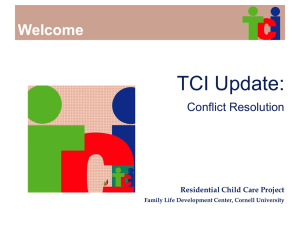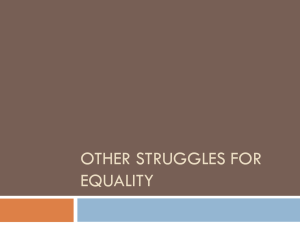PRINCE v. MASSACHUSETTS, 321 U.S. 158 (1944)
advertisement
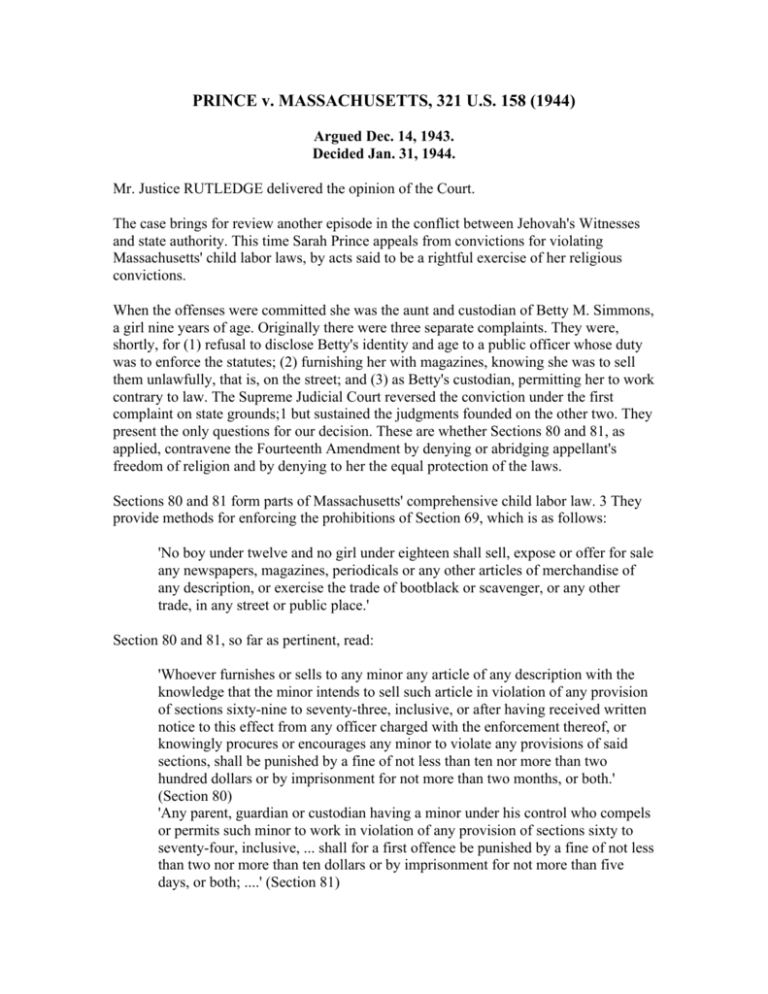
PRINCE v. MASSACHUSETTS, 321 U.S. 158 (1944) Argued Dec. 14, 1943. Decided Jan. 31, 1944. Mr. Justice RUTLEDGE delivered the opinion of the Court. The case brings for review another episode in the conflict between Jehovah's Witnesses and state authority. This time Sarah Prince appeals from convictions for violating Massachusetts' child labor laws, by acts said to be a rightful exercise of her religious convictions. When the offenses were committed she was the aunt and custodian of Betty M. Simmons, a girl nine years of age. Originally there were three separate complaints. They were, shortly, for (1) refusal to disclose Betty's identity and age to a public officer whose duty was to enforce the statutes; (2) furnishing her with magazines, knowing she was to sell them unlawfully, that is, on the street; and (3) as Betty's custodian, permitting her to work contrary to law. The Supreme Judicial Court reversed the conviction under the first complaint on state grounds;1 but sustained the judgments founded on the other two. They present the only questions for our decision. These are whether Sections 80 and 81, as applied, contravene the Fourteenth Amendment by denying or abridging appellant's freedom of religion and by denying to her the equal protection of the laws. Sections 80 and 81 form parts of Massachusetts' comprehensive child labor law. 3 They provide methods for enforcing the prohibitions of Section 69, which is as follows: 'No boy under twelve and no girl under eighteen shall sell, expose or offer for sale any newspapers, magazines, periodicals or any other articles of merchandise of any description, or exercise the trade of bootblack or scavenger, or any other trade, in any street or public place.' Section 80 and 81, so far as pertinent, read: 'Whoever furnishes or sells to any minor any article of any description with the knowledge that the minor intends to sell such article in violation of any provision of sections sixty-nine to seventy-three, inclusive, or after having received written notice to this effect from any officer charged with the enforcement thereof, or knowingly procures or encourages any minor to violate any provisions of said sections, shall be punished by a fine of not less than ten nor more than two hundred dollars or by imprisonment for not more than two months, or both.' (Section 80) 'Any parent, guardian or custodian having a minor under his control who compels or permits such minor to work in violation of any provision of sections sixty to seventy-four, inclusive, ... shall for a first offence be punished by a fine of not less than two nor more than ten dollars or by imprisonment for not more than five days, or both; ....' (Section 81) The story told by the evidence has become familiar. It hardly needs repeating, except to give setting to the variations introduced through the part played by a child of tender years. Mrs. Prince, living in Brockton, is the mother of two young sons. She also has legal custody of Betty Simmons who lives with them. The children too are Jehovah's Witnesses and both Mrs. Prince and Betty testified they were ordained ministers. The former was accustomed to go each week on the streets of Brockton to distribute 'Watchtower' and 'Consolation,' according to the usual plan. She had permitted the children to engage in this activity previously, and had been warned against doing so by the school attendance officer, Mr. Perkins. But, until December 18, 1941, she generally did not take them with her at night. That evening, as Mrs. Prince was preparing to leave her home, the children asked to go. She at first refused. Childlike, they resorted to tears and, motherlike, she yielded. Arriving downtown, Mrs. Prince permitted the children 'to engage in the preaching work with her upon the sidewalks.' That is, with specific reference to Betty, she and Mrs. Prince took positions about twenty feet apart near a street intersection. Betty held up in her hand, for passersby to see, copies of 'Watch Tower' and 'Consolation.' From her shoulder hung the usual canvas magazine bag, on which was printed 'Watchtower and Consolation 5¢ per copy.' No one accepted a copy from Betty that evening and she received no money. Nor did her aunt. But on other occasions, Betty had received funds and given out copies. Mrs. Prince and Betty remained until 8:45 p.m. A few minutes before this Mr. Perkins approached Mrs. Prince. A discussion ensued. He inquired and she refused to give Betty's name. However, she stated the child attended the Shaw School. Mr. Perkins referred to his previous warnings and said he would allow five minutes for them to get off the street. Mrs. Prince admitted she supplied Betty with the magazines and said, '(N)either you nor anybody else can stop me .... This child is exercising her God- given right and her constitutional right to preach the gospel, and no creature has a right to interfere with God's commands.' However, Mrs. Prince and Betty departed. She remarked as she went, 'I'm not going through this any more. We've been through it time and time again. I'm going home and put the little girl to bed.' It may be added that testimony, by Betty, her aunt and others, was offered at the trials, and was excluded, to show that Betty believed it was her religious duty to perform this work and failure would bring condemnation 'to everlasting destruction at Armageddon.' The only question remaining therefore is whether, as construed and applied, the statute is valid. Upon this the court said: 'We think that freedom of the press and of religion is subject to incidental regulation to the slight degree involved in the prohibition of the selling of religious literature in streets and public places by boys under twelve and girls under eighteen and in the further statutory provisions herein considered, which have been adopted as a means of enforcing that prohibition.' Appellant does not stand on freedom of the press. Regarding it as secular, she concedes it may be restricted as Massachusetts has done. 7 Hence, she rests squarely on freedom of religion under the First Amendment, applied by the Fourteenth to the states. She buttresses this foundation, however, with a claim of parental right as secured by the due process clause of the latter Amendment. Cf. Meyer v. Nebraska. These guaranties, she thinks, guard alike herself and the child in what they have done. Thus, two claimed liberties are at stake. One is the parent's, to bring up the child in the way he should go, which for appellant means to teach him the tenets and the practices of their faith. The other freedom is the child's, to observe these; and among them is 'to preach the gospel ... by public distribution' of 'Watchtower' and 'Consolation,' in conformity with the scripture: 'A little shall lead them.' To make accommodation between these freedoms and an exercise of state authority always is delicate. It hardly could be more so than in such a clash as this case presents. On one side is the obviously earnest claim for freedom of conscience and religious practice. With it is allied the parent's claim to authority in her own household and in the rearing of her children. The parent's conflict with the state over control of the child and his training is serious enough when only secular matters are concerned. It becomes the more so when an element of religious conviction enters. Against these sacred private interests, basic in a democracy, stand the interests of society to protect the welfare of children, and the state's assertion of authority to that end, made here in a manner conceded valid if only secular things were involved. The last is no mere corporate concern of official authority. It is the interest of youth itself, and of the whole community, that children be both safeguarded from abuses and given opportunities for growth into free and independent well-developed men and citizens. Between contrary pulls of such weight, the safest and most objective recourse is to the lines already marked out, not precisely but for guides, in narrowing the no man's land where this battle has gone on. The rights of children to exercise their religion, and of parents to give them religious training and to encourage them in the practice of religious belief, as against preponderant sentiment and assertion of state power voicing it, have had recognition here, most recently in West Virginia State Board of Education v. Barnette, 319 U.S. [321 U.S. 158, 166] 624, 63 S.Ct. 1178. Previously in Pierce v. Society of Sisters, this Court had sustained the parent's authority to provide religious with secular schooling, and the child's right to receive it, as against the state's requirement of attendance at public schools. And in Meyer v. Nebraska, children's rights to receive teaching in languages other than the nation's common tongue were guarded against the state's encroachment. It is cardinal with us that the custody, care and nurture of the child reside first in the parents, whose primary function and freedom include preparation for obligations the state can neither supply nor hinder. And it is in recognition of this that these decisions have respected the private realm of family life which the state cannot enter. But the family itself is not beyond regulation in the public interest, as against a claim of religious liberty. And neither rights of religion nor rights of parenthood are beyond limitation. Acting to guard the general interest in youth's well being, the state as parens patriae may restrict the parent's control by requiring school attendance, regulating or prohibiting the child's labor, and in many other ways. Its authority is not nullified merely because the parent grounds his claim to control the child's course of conduct on religion or conscience. The state has a wide range of power for limiting parental freedom and authority in things affecting the child's welfare; and that this includes, to some extent, matters of conscience and religious conviction. But it is said the state cannot do so here. This, first, because when state action impinges upon a claimed religious freedom, it must fall unless shown to be necessary for or conducive to the child's protection against some clear and present danger; and, it is added, there was no such showing here. The child's presence on the street, with her guardian, distributing or offering to distribute the magazines, it is urged, was in no way harmful to her, nor in any event more so than the presence of many other children at the same time and place, engaged in shopping and other activities not prohibited. Accordingly, in view of the preferred position the freedoms of the First Article occupy, the statute in its present application must fall. Concededly a statute or ordinance identical in terms with Section 69, except that it is applicable to adults or all persons generally, would be invalid. But the mere fact a state could not wholly prohibit this form of adult activity, whether characterized locally as a 'sale' or otherwise, does not mean it cannot do so for children. Such a conclusion granted would mean that a state could impose no greater limitation upon child labor than upon adult labor. Or, if an adult were free to enter dance halls, saloons, and disreputable places generally, in order to discharge his conceived religious duty to admonish or dissuade persons from frequenting such places, so would be a child with similar convictions and objectives, if not alone then in the parent's company, against the state's command. The state's authority over children's activities is broader than over like actions of adults. This is peculiarly true of public activities and and matters of employment. A democratic society rests, for its continuance, upon the healthy, well-rounded growth of young people into full maturity as citizens, with all that implies. It may secure this against impeding restraints and dangers, within a broad range of selection. Among evils most appropriate for such action are the crippling effects of child employment, more especially in public places, and the possible harms arising from other activities subject to all the diverse influences of the street. It is too late now to doubt that legislation appropriately designed to reach such evils is within the state's police power, whether against the parents claim to control of the child or one that religious scruples dictate contrary action. What may be wholly permissible for adults therefore may not be so for children, either with or without their parents' presence. The case reduces itself therefore to the question whether the presence of the child's guardian puts a limit to the state's power. That fact may lessen the likelihood that some evils the legislation seeks to avert will occur. But it cannot forestall all of them. The zealous though lawful exercise of the right to engage in propagandizing the community, whether in religious, political or other matters, may and at times does create situations difficult enough for adults to cope with and wholly inappropriate for children, especially of tender years, to face. Other harmful possibilities could be stated, of emotional excitement and psychological or physical injury. Parents may be free to become martyrs themselves. But it does not follow they are free, in identical circumstances, to make martyrs of their children before they have reached the age of full and legal discretion when they can make that choice for themselves. Massachusetts has determined that an absolute prohibition, though one limited to streets and public places and to the incidental uses proscribed, is necessary to accomplish its legitimate objectives. Its power to attain them is broad enough to reach these peripheral instances in which the parent's supervision may reduce but cannot eliminate entirely the ill effects of the prohibited conduct. We think that with reference to the public proclaiming of religion, upon the streets and in other similar public places, the power of the state to control the conduct of children reaches beyond the scope of its authority over adults, as is true in the case of other freedoms, and the rightful boundary of its power has not been crossed in this case. The judgment is affirmed.
